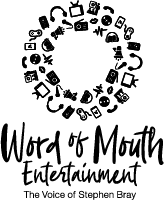Voice Over FAQ.
Let us help you find answers to common voice over questions.
Want to find out more about voice overs? How the voice over process works? Voice over services offered. The answers to these and more can be found below.
What is a voiceover?
A voiceover is person who can convey and tell a story, connect with people an audiences in such a way that they are engaged, transformed to another place, entertained and moved by the voiceover talent and skill. The voiceover stands behind a microphone in a home or professional studio reading aloud a script whilst being recorded. Their brief is different every time, with a fit for purpose objective. A good voiceover will reach their audience each time, capturing the essence of the brand, the scene, the feel that the actor is there to facilitate.
Why would I need a voiceover?
You would get the services of a voiceover to reach and engage your clients. This could be through advertisements, websites, phone messaging, animation/cartoons, narration on a documentary, e-learning and audio books anything that requires a voice even sports commentating.
What sort of voice over work do you do?
A voiceover needs to be versatile and adaptable for you are doing a variety of jobs; for it’s not just about speaking into a microphone. Unless of course you are a celebrity and have an agent, studio team, marketing team. You have to be able to have marketing, business, accounting/bookkeeping, editing skills as well being a self-director and possess time management skills. The sort of jobs that you can do is radio/TV commercials, audio books, e-learning, animation/cartoons, on hold messaging, corporate narration, narration, in-store announcements, pod casts intro’s and exits. MC work, movie trailers/previews, website tutorials/introductions.
How long have you been a voice actor?
As a voiceover not long but have studied extensively and have taken different voiceover courses in Melbourne. I have 7 years acting experience having worked at Kryal Castle/Ballarat. I’ve created and continue to become a variety of different characters whilst role-playing Dungeons and Dragons for which I’ve played over the past 20+ years.
What happens in the studio?
What is the home studio process?
How do you become a voiceover?
You need to have a demo, a short recording of yourself executing different type of reads, and of standard that one would expect in the voiceover industry. A good example of a demo is a 15-30 second grab for a radio commercial or a couple of paragraphs from a book becoming a number of characters, personalities and narration. Until you have the necessary skills, your demo should be created by a professional. They provide you with the guidance, quality and expertise that a client would expect when considering a large range of talent. There are self-help books and courses that can teach you how to begin in the profession however if you are planning on becoming a full time professional you must register for voiceover courses, webinars and other educational forums that are available within the industry. YouTube being another great resource in receiving guidance from those in the industry.
Is being a voiceover artist profitable?
Most people start out as a voiceover part time in order to supplement their income. As they receive more work the better voiceover talent may transition into full time positions. There are those who make a great living in being a voiceover, ranging from anything like $50 thousand or above. Those in the well above bracket range with a 6-figure+ income are either celebrities or very well regarded within the industry. It also depends on the job, the location and duration of the work. To be successful in the voiceover industry you must be persistent and have patience as well as having a thick skin as getting used to rejection is part of the industry.
What does a good voiceover talent look like?
The beauty of being a voiceover actor is it doesn’t matter what you look like as long as you can read the script and be able to take direction. A voiceover must be a chameleon and able to perform a good variety of roles. It is not just about being able to speak into a microphone. A voiceover must be prepared and able to market the voice, possess good business skills and accounting skills not to mention technical skills in audio editing, management and understanding of other audio software programs and capabilities as a self-director and great time management.
What work can a voiceover expect?
The variety of jobs that one can do in this career are diverse. Everyday changing technology along-side with more traditional mediums such as radio & TV commercials are up for grabs. Some great examples of this are general narration, audio books, e-learning, animation, cartoons, corporate phone messaging, corporate narration, in-store announcements, pod cast intro’s and exits, MC work, movie trailers & previews, website tutorials & introductions the list is endless.
